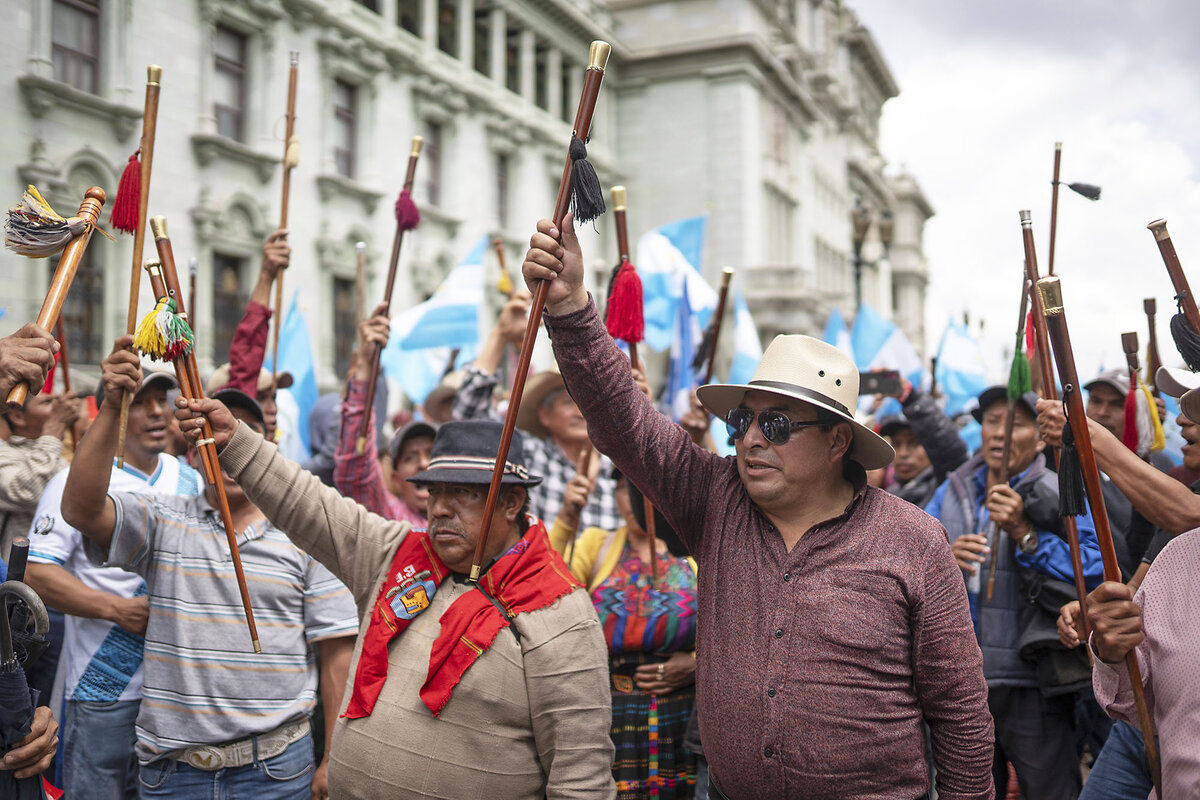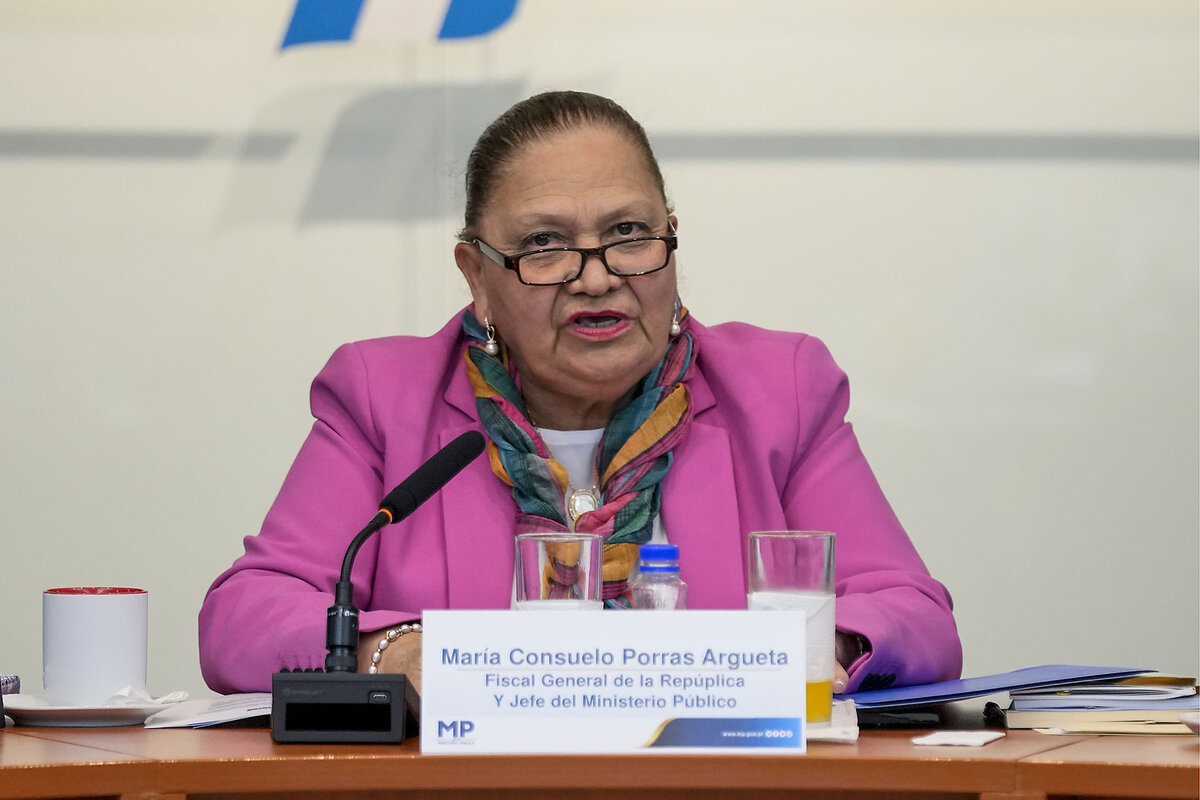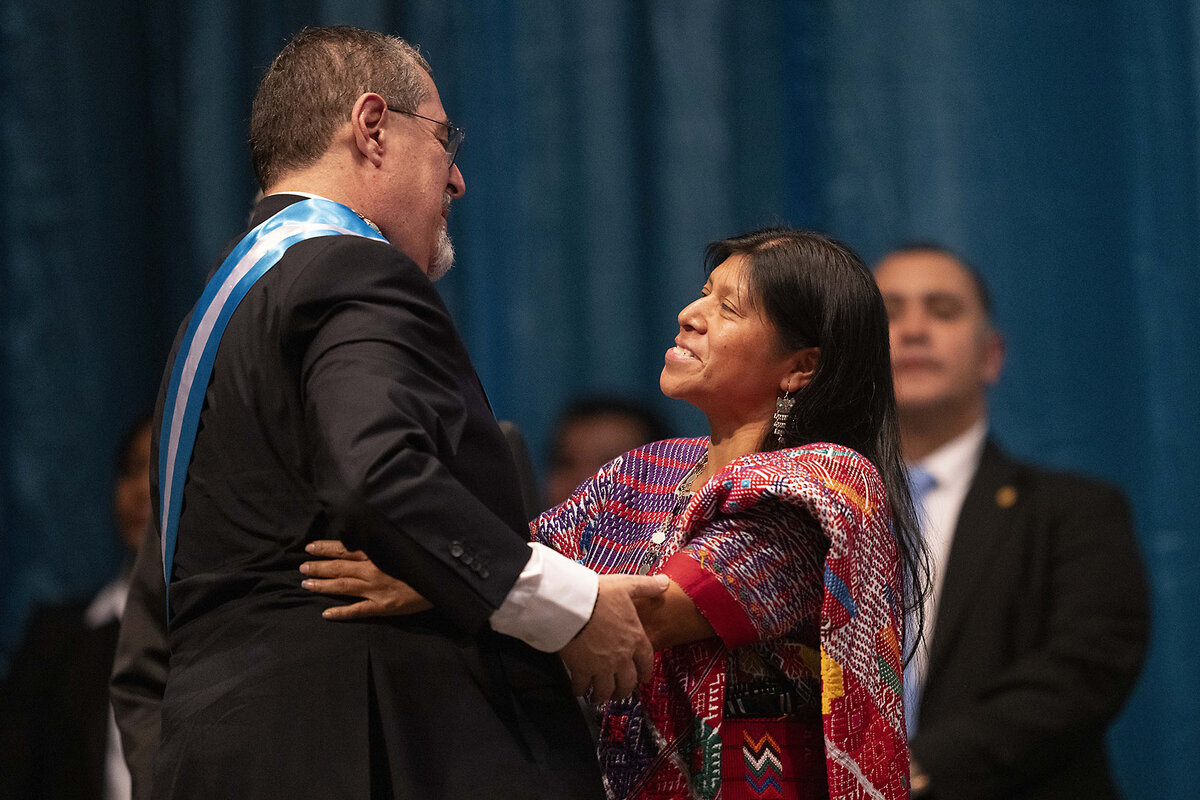How hard is it to root out corruption? Ask Guatemala’s new president.
Loading...
| Guatemala City
By most counts, it’s a miracle that Guatemala’s President Bernardo Arévalo has been in office for nearly six months. The anti-corruption politician faced unprecedented legal challenges to his campaign last summer, a powerful attorney general tried to reverse his election victory, and three months of public demonstrations swamped the capital in efforts to ensure his inauguration.
But the heavy lift it took to get him into office, where he has promised to weed out corruption and strengthen his small Central American nation’s democracy, hasn’t eased. Citizens who spent months on the streets are starting to wonder when Mr. Arévalo will deliver on promised change. Complicating the situation, the attorney general, María Consuelo Porras, who has been sanctioned by 42 foreign countries including the U.S., is blocking his efforts at every turn.
“This is not a marathon,” Mr. Arévalo said at an event on April 4, acknowledging the population’s frustration with slow progress on passing anti-corruption legislation. “It is a game of chess,” he said, referring to the fine-tuned strategy needed to confront the fact that his party has just 14% of the seats in Congress, and his agenda angers Guatemala’s historically powerful political and economic elite.
Why We Wrote This
A story focused onGuatemala’s new President Bernardo Arévalo pledged to clean up corruption. Facing down a hostile attorney general, he’s realizing that his anti-corruption agenda will take more than just political will and popular support.
Mr. Arévalo’s struggles underscore how challenging it can be to fight corruption, despite widespread public support.
“It’s difficult for corruption to be your flag,” says Marielos Chang, a political scientist and professor at Universidad del Valle in Guatemala. Solving it “is complex and [so is] getting results that improve people’s quality of life.”
Those who have successfully fought corruption in the past in Guatemala, says Ms. Chang, have had a solidly independent justice department, “allowing them to prosecute major political figures” without interference.
The president vs. the attorney general
Teamwork with the justice department and the attorney general is precisely what Mr. Arévalo lacks.
The central threat to his government and its anti-corruption promises is Ms. Porras. Last August, she tried to annul Mr. Arévalo’s votes following his electoral victory. Citizen pressure from the streets, the organization of Indigenous and rural communities, and an international community that closed ranks, together defended the country’s democracy.
The president has tried, unsuccessfully, to remove Ms. Porras from office.
“The dark cycle of Consuelo Porras must end now,” Mr. Arévalo said in a national address on May 6. The next day, he delivered a bill to Congress that would allow him to dismiss the attorney general before the end of her four-year term in 2026. He needed 107 votes for his initiative to succeed, but only won 50, a resounding defeat and potentially a grave political misstep, experts say.
The vote “benefited Porras, not only because she survived the threat of being removed from office, but because she grew stronger in the eyes of those who could be allies of [Movimiento] Semilla,” Mr. Arévalo’s party, says Manuel Meléndez-Sánchez, a doctoral candidate in political science and researcher at Harvard University.
“It was a ... poor reading of the political times,” says Ms. Chang. It turned an important fight against a scourge afflicting every level of the government into “something personal between two political figures,” she says.
In mid-May, Ms. Porras presented an annual report on the public ministry’s work, surrounded by the heads of prosecutors’ offices from across the country, in a show of solidarity against the president’s pledges to enact big change in Guatemala.
Resistance to Mr. Arévalo comes from key actors and institutions that have deep interests in ensuring business as usual in Guatemala. They include many officials in the justice department and the courts, opposition parties in Congress, and powerful economic elites targeted by a now defunct, internationally-backed, anti-corruption body.
Mr. Arévalo says he knows Guatemalans are frustrated.
“With the pieces it has on the [chess] board, the odds are that the government will lose,” says Mr. Meléndez-Sánchez, because the president has not been set up for a fair match. The country is described as a “hybrid regime,” combining elements of formal democracy and authoritarianism, by The Economist Intelligence Unit’s Democracy Index. Guatemala is ranked 100th out of 160 countries in terms of its democratic health.
“A minefield of corruption”
In his first month in office, Mr. Arévalo removed more than 1,300 people from government positions, either because they were not qualified for their posts, or because they had been given their jobs by previous administrations as political favors.
“The outgoing government left a minefield of corruption,” says Mr. Meléndez-Sánchez.
In the coming months, Guatemala will begin selecting new members of its Supreme Court of Justice and Courts of Appeals. More than 180 positions will be filled by Congress and the new judges will serve five-year terms. The stakes are high: These magistrates could face future requests to withdraw Mr. Arévalo’s presidential immunity, something that could lead to his dismissal.
Adding to these challenges is that Movimiento Semilla is a young and relatively weak party. A few days after assuming the presidency, the Constitutional Court, the highest in Guatemala, ruled that Semilla, under investigation over how it was founded, cannot work as a bloc in Congress. That prevents the party’s legislators from serving on committees and thus limits its ability to influence the legislative agenda.
Corruption has long been a scourge in Central America, but recent studies show it is growing. The situation in Guatemala shows how it is not enough to defeat autocrats at the polls and assume power – there follows the complexity of cleaning up public institutions.
“The authoritarians, when they are defeated, leave these authoritarian enclaves that are precisely the ones Arévalo is fighting against,” says Mr. Meléndez-Sánchez. It requires “strategy.”
And, crucially, patience.
Kelvin Jiménez, a lawyer for the indigenous Xinca Parliament, was part of the organization of nine Indigenous groups that protested for three months in front of the attorney general’s office last year. He is one of many citizens frustrated by the fact that Ms. Porras is still in office and that more progress has not been made in the fight against corruption.
But, he acknowledges, there have been some small improvements. This administration was the first to meet with Indigenous communities to draw up an agenda promoting social and environmental development, he says.
“Perhaps we were not so aware of the seriousness of the institutional deterioration that’s been an obstacle to the government,” Mr. Jiménez says. “The population must continue to embrace a process of change” even if it comes slowly.








